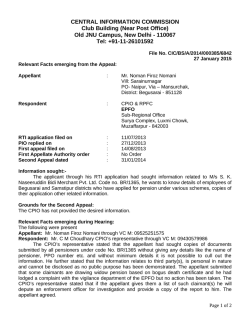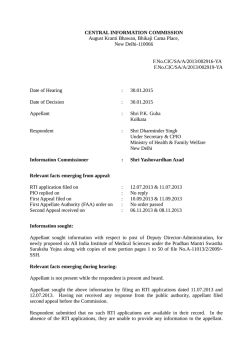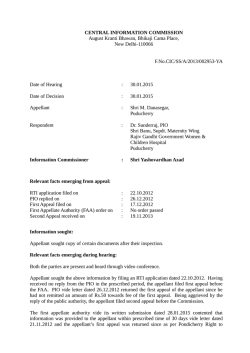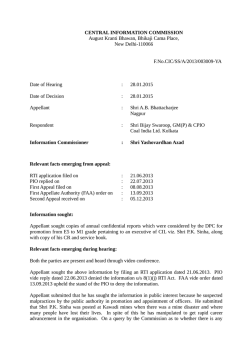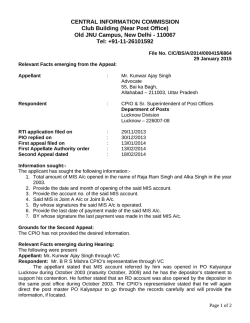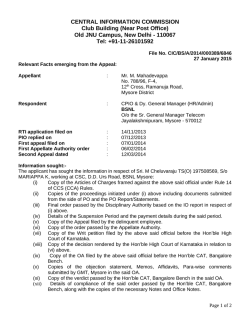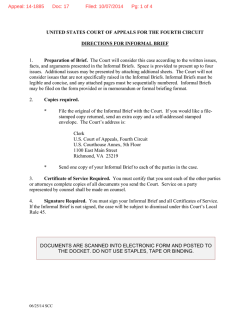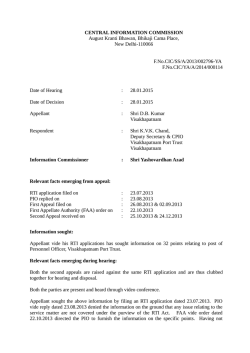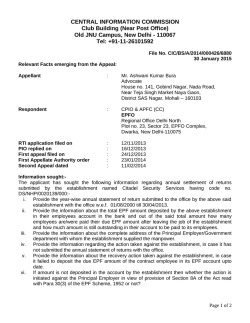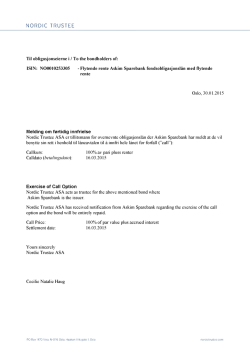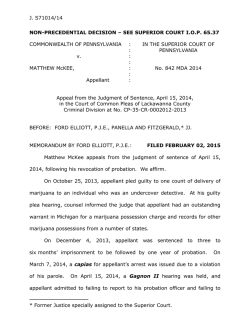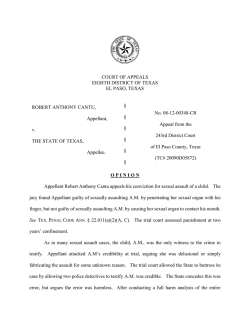
a-6087-12t2 in the matter of samuel dantoni and marilyn dantoni
NOT FOR PUBLICATION WITHOUT THE
APPROVAL OF THE APPELLATE DIVISION
SUPERIOR COURT OF NEW JERSEY
APPELLATE DIVISION
DOCKET NO. A-6087-12T2
IN THE MATTER OF
SAMUEL DANTONI AND
MARILYN DANTONI.
_______________________________
Argued September 29, 2014 - Decided January 29, 2015
Before
Judges
Rothstadt.
Lihotz,
St.
John
and
On appeal from the Superior Court of New
Jersey, Chancery Division, Probate Part,
Burlington County, Docket No. 2010-1960.
Pasquale Guglietta argued the cause for
appellant Mark Dantoni (Price & Price, LLC,
attorneys;
Carl
Ahrens
Price,
on
the
briefs).
J. Llewellyn Mathews, respondent, argued the
cause pro se.
PER CURIAM
In
this
acrimonious
litigation,
we
review
challenges
to
Chancery Court orders denying payments from a trust created to
provide for the needs of Samuel and the late Marilyn Dantoni
(the
Dantonis).
established
the
Paragraph
procedure
19
of
for
regarding the terms of the trust.
an
filing
April
10,
2012
enforcement
order
motions
Appellant Mark Dantoni, one
of the Dantoni's four children, challenges a July 3, 2013 order,
which
denied
reimbursement
of
certain
medical
expenses
he
incurred
on
behalf
of
his
mother
and
sanctioned
him
for
disregarding the procedure set forth in paragraph 19 by ordering
he pay attorney's fees incurred by the court-appointed trustee
J. Llewellyn Mathews.
Following our review, we conclude the appeal of paragraph
19 is untimely.
However, we reverse the award of attorney's
fees as they were imposed by applying a portion of paragraph 19
that we find unenforceable.
We remand the trustee's fee request
to the trial court for consideration without the application of
paragraph 19.
The background surrounding this legal battle, essentially
between two of four siblings at odds over the fortunes and fates
of
their
infirmed
parents,
was
detailed
in
our
unpublished
opinion that addressed appellant's appeal of prior orders.
See
In re Dantoni, No. A-1550-12 (App. Div. August 15, 2014) (slip
op.
at
5-14).
appellant
attorney
We
need
principally
on
behalf
of
not
cared
repeat
those
facts,
through
for
and
acted
Marilyn,
and
his
sister
but
note,
power
Joan
of
Harris
principally cared for and acted through power of attorney on
behalf of Samuel.
The couple lived together in the marital home
in Medford until Samuel's health declined in 2010.
Harris moved
Samuel to an assisted living facility in Maryland where he was
declared disabled; Marilyn lived in the former marital house
2
A-6087-12T2
until 2012, when she was hospitalized until her death in 2013.1
The geographic separation of the Dantonis serves as a metaphor
for
the
siblings'
divide
created
by
their
distrust
for
one
another.
Ultimately, in an attempt to end the escalating litigation,
a
mediated
settlement
agreement,
approved
by
the
court
on
January 31, 2011, created an irrevocable inter vivos trust to
hold and administer the Dantonis' remaining assets and income
for
their
"primary
care
and
maintenance."
An
independent
trustee was appointed to gather the Dantonis' assets and income,
satisfy obligations, annually report transactions, and assure
the children acted to allow the couple to visit each other.
The
trust granted the trustee "sole discretion" to "distribute to or
for the benefit of the [Dantonis] as much of the principal and
accrued income, as well as income paid into the trust . . . for
their general use, including but not limited to, their comfort,
health,
maintenance,
and
support."
All
litigation
was
dismissed.
Unfortunately, the attempted resolution unleashed volleys
of
motions
to
comply
with
provisions
of
the
settlement
1
The Dantoni's other two children are Patricia Brinster and
Carole Platas.
Brinster filed a certification in support of
appellant's motion, but neither Brinster nor Platas have
participated in this appeal.
We have been advised that Samuel
Dantoni passed away on October 24, 2014.
3
A-6087-12T2
agreement.
On April 10, 2012, an order was filed addressing the
various requests for relief.
Paragraph 19 of the order required
future motions for enforcement of litigant's rights must first
be presented to the trustee, who would review the application
and advise whether she supported the request.
If the trustee
supported the motion, the movant was entitled to receive counsel
fees and costs associated with the motion from the trust fund,
subject to judicial review.
If the trustee did not support the
motion, the movant was not entitled to an award of fees.2
2
The order stated its purpose was to "clarif[y] the process
for any future motions to enforce litigant's rights in this
case," providing:
Before a party files a motion, they must
first present it to the [t]rustee in writing
on notice to all interested parties.
After
the [t]rustee has reviewed the motion, said
motion can be filed with the [c]ourt.
The
[t]rustee will advise the parties whether or
not he/she is in support of the motion to
enforce litigant's rights. If the [t]rustee
does not support the motion to enforce
litigant's rights, then there will be no
allowance for attorney's fees and costs from
the [t]rust, for that filing party. If the
[t]rustee supports the motion to enforce
litigant's rights, then the filing party can
request attorney's fees and costs associated
with the motion, payment of which is subject
to review by the [c]ourt.
4
A-6087-12T2
The heightened malevolence and lack of cooperation between
appellant and Harris led to the initial trustee's resignation.
Mathews was appointed as a successor trustee.
Mathews
filed
a
complaint
seeking
advice
and
direction
because the trust's funds were insufficient to meet "ongoing
cash needs."
Since Samuel lived in Maryland and Marilyn was
hospitalized, Mathews proposed the sale of their Medford home
"to generate cash to help meet the needs of the [t]rust."
The
trustee also sought to compel appellant, on behalf of Marilyn,
to
execute
and
deliver
an
unadulterated
seller's
residency
certification, and any other documents necessary to transfer the
home to the trust and effectuate its sale.
Four days after
filing the complaint, Mathews learned Marilyn had passed away.
He
withdrew
his
request
regarding
appellant's
provision
of
documents to sell the realty, but sought to replace the drafted
deed for the Medford home and obtain the necessary certificate
allowing transfer from Harris, as Samuel's legal guardian.
The
court addressed the requests regarding the sale of the realty in
a May 13, 2013 order.
Appellant responded with a motion for enforcement relief.
He withdrew his previously filed objection to the sale of the
Medford realty, subject to an award of his requested expenses,
but objected to the proposed listing price for the realty as too
5
A-6087-12T2
low, sought a formal appraisal, requested Mathews' ability to
reduce the listing price be limited, and requested he be given a
key
and
"unrestricted
access"
to
the
realty.
Appellant
challenged the trustee's other requests compelling him to act
and
justified
his
delay
in
providing
certain
documentation.
Appellant also sought relief in the form of reimbursement, with
interest, for various expenses he alleged he incurred on behalf
of Marilyn, including costs expended to maintain and repair the
Medford home in anticipation of her return, for a home companion
and Marilyn's funeral expenses.
Finally, appellant requested an
order requiring Harris to amend the designated beneficiary of
Samuel's federal employee group life insurance (FEGLI) policy to
name the trust, rather than Harris, as the beneficiary.
The judge considered appellant's motion separately from the
sale of the realty.
In a July 3, 2013 order, she addressed the
requests which were granted in part, denied in part, and denied
without prejudice in part.
judge
described
appellant's
In her statement of reasons, the
motion
as
"a
comprehensive
new
motion outside of the scope of the [o]rder to [s]how [c]ause,
dealing with claims to the proceeds of an eventual sale of the
house."
paragraph
She discussed the basis for adopting the procedure in
19.
The
judge
noted
appellant
"disregarded
this
court's April 10, 2012 order and filed a motion which was not
6
A-6087-12T2
provided in advance to the [t]rustee in writing, nor was notice
provided to all interested parties prior to filing."
Despite
his noncompliance, the judge reviewed the merits of each of
appellant's requests.
Appellant filed his notice of appeal on August 16, 2013.
His accompanying civil case information statement (CIS) does not
challenge
relief
the
dispositive
contained
in
the
determinations
of
July
order
3,
2013
his
requests
under
for
review.
Rather, the heart of appellant's argument limits our review to
$2,090 in fees to the trustee . . . to be
paid by [a]ppellant . . . as a sanction for
violating the [c]ourt's [o]rder of April 10,
2012.
[Appellant] appeals [from] both the
entry of the sanction as well as the
procedure put in place by the April 10,
2012, [o]rder compelling all motions to be
approved by the trustee.
Further,
review:
appellant's
two
infringing
on
attack
brief
the
appellant's
lists
three
"procedure"
due
in
process
legal
issues
paragraph
rights
19
and
for
as
an
unconstitutional delegation of judicial authority, and the last
argues the fee award was an unwarranted exercise of judicial
discretion.
We have no difficulty dismissing, as untimely, appellant's
challenges, which collaterally attack paragraph 19.
R. 2:4-
1(a).
Appellant participated in the proceeding resulting in the
April
10,
2012
order
and
was
7
well
aware
of
its
terms
and
A-6087-12T2
application, including paragraph 19.
slip op. at 7.
See In re Dantoni, supra,
The challenge raised in this matter to the
enforceability of paragraph 19 was filed more than a year after
its initial entry.
Further, we are not persuaded by appellant's
argument suggesting he timely appealed from the implementation
of the order.
Appellant cannot disregard the entry of a final
order and wait until its enforcement to challenge its entry.
"An appeal from a final judgment must be filed with the
Appellate
2:4-1,
Division
and
served
within
upon
forty-five
all
other
days
of
its
parties,
R.
entry,
R.
2:5-1(a)."
Lombardi v. Masso, 207 N.J. 517, 540 (2011) (emphasis added).
In the event that the time limits in Rule
2:4-1 are not satisfied, for example, where
the notice is late, a motion to extend the
time for appeal may be filed, pursuant to
Rule 2:4-4, for a period not exceeding
thirty days. That motion must be served and
filed within the time as extended.
[Id. at 540-541.]
Rule
authority.
2:4-1
circumscribes
the
scope
of
this
court's
In re Christie's Appointment of Perez as Public
Member 7 of Rutgers Univ. Bd. of Governors, 436 N.J. Super. 575,
584
(App.
Div.
2014).
"'Where
the
appeal
is
untimely,
the
Appellate Division has no jurisdiction to decide the merits of
the appeal.'"
Ridge at Back Brook, LLC v. Klenert, 437 N.J.
8
A-6087-12T2
Super. 90, 97 n.4 (App. Div. 2014) (quoting In re Hill, 241 N.J.
Super. 367, 372 (App. Div. 1990)).
Nevertheless,
"[t]he
courts
have
from
time
to
time
considered appeals, although not timely filed, in which issues
of genuine public importance have been raised."
supra,
436
N.J.
Super.
at
585
(citing
Jacobs
Highway Auth., 54 N.J. 393, 396 (1969)).
In re Christie,
v.
N.J.
State
See, e.g., In re
Rodriguez, 423 N.J. Super. 440, 447 (App. Div. 2011); Rumana v.
Cnty. of Passaic, 397 N.J. Super. 157, 171-72 (App. Div. 2007).
See also Pressler & Verniero, Current N.J. Court Rules, comment
3.2.2
on
R.
2:2-3
(2015)
("[B]ecause
the
allocation
to
the
Appellate Division is not jurisdictional in the strict subjectmatter sense, [it] may, in the public interest, opt to address
the merits of a dispute improvidently brought before it.").
do
not
find
this
matter
is
such
a
case,
thus,
We
appellant's
request for review is rejected as untimely.
An
additional
procedural
problem
is
posed
by
the
insufficiency of appellant's notice of appeal, which lists only
the July 3, 2013 order from which his appeal is taken.
notice
of
appeal
refers
to
appellant's
CIS,
includes the challenge to paragraph 19.
which
in
The
turn
However, Rule 2:5-
1(f)(3)(A) requires the notice of appeal in civil actions to
"designate
the
judgment,
decision,
9
action
or
rule,
or
part
A-6087-12T2
thereof appealed from. . . ."
Therefore, only the designated
July 3, 2013 order remains subject to appellate review.
See,
e.g., 30 River Court E. Urban Renewal Co. v. Capograsso, 383
N.J. Super. 470, 473-74 (App. Div. 2006) (refusing to review
orders
dismissing
the
defendant's
affirmative
claims
because
they were not included in her notice of appeal); Campagna ex
rel. Greco v. Am. Cyanamid Co., 337 N.J. Super. 530, 550 (App.
Div.) (refusing to consider an order not listed in the notice of
appeal), certif. denied, 168 N.J. 294 (2001).
Although our analysis of issues presented in this appeal
need not go further, we comment briefly on concerns implicated
by appellant's challenges.
paragraph
19's
infringing
his
He attacks what he characterizes as
unconstitutional,
access
to
the
"impermissible
courts.
obstacle"
Unquestionably,
"'the
complete denial of the filing of a claim without judicial review
of its merits would violate the constitutional right to access
of the courts.'"
Parish v. Parish, 412 N.J. Super. 39, 48 (App.
Div. 2010) (quoting Rosenblum v. Borough of Closter, 333 N.J.
Super. 385, 390 (App. Div. 2000)).
See U.S. Const. amend. XIV,
§ 1.
In
this
matter,
as
the
judge
designed to allow the trustee
noted,
paragraph
19
was
the opportunity to consider a
party's request prior to initiation of process, as he held sole
10
A-6087-12T2
discretion over fiscal issues and would determine whether to pay
purported
expenses.
provision
was
Contrary
designed
to
to
appellant's
control
the
suggestion
court's
calendar,
the
we
determine the implementation of this procedure was to preserve
the Dantonis' dwindling assets for their health, maintenance and
support by avoiding unnecessary depletion caused by unwarranted
litigation.
courts.
Paragraph 19 did not enjoin or deny access to the
Instead, it facilitated the enforcement of the consent
order, assuring the trustee's involvement and review prior to
incurring the expense and time of formal motion practice.
all,
if
the
trustee
supported
the
payment
or
After
enforcement
request, likely nothing more was necessary.
Further, paragraph
19 contained no preclusion of court relief.
In fact, appellant
filed
that
numerous
motions
from
the
date
of
order.
The
trustee, as a necessary party-in-interest to any litigation, was
required to receive notice of a party's motion.
These provisions are unlike the restrictions imposed by the
order reviewed in Parish or Rosenblum.
In those matters no
motion was permitted to be filed unless certain prerequisites
were satisfied.
"Judges retain the inherent authority to impose
reasonable
conditions
appropriate
case
on
management
administration of the case."
motion
and
the
practice
efficient
to
and
allow
for
effective
Zehl v. City of Elizabeth Bd. of
11
A-6087-12T2
Educ., 426 N.J. Super. 129, 141 (App. Div. 2012).
Judges are
permitted to utilize management tools to aid the efficiency of
resolving
disputes
to
address
those
cases
"that
are
time-
consuming, contentious beyond reason, and a significant drain on
both judicial time and resources."
Id. at 142.
This case reflects one such matter.
in
2009.
Despite
the
unmistakable
Litigation commenced
terms
of
the
settlement
agreement and the trust, motions, each met by opposition and
cross-motions
seeking
enforcement,
were
regularly
filed.
Overall, the paragraph's requirement for prior notice to the
trustee
neither
impeded
court
burdensome requirements.
access
nor
imposed
unduly
We conclude that provision did not
infringe upon appellant's due process rights, but was designed
to aid the trustee in performing his discretionary functions
pursuant to the trust's terms.
We cannot, however, reach a similar conclusion regarding
the
order's
consequence
for
violating
the
imposed
procedure,
which eliminated a party's possible right to receive attorney's
fees
associated
with
filing
and
prosecuting
trustee did not support the proposed motion.
provision
is
unenforceable
and
must
be
requests
if
the
We conclude this
stricken,
because
it
represents an impermissible delegation of court authority.
12
A-6087-12T2
The court alone has discretion to "make an allowance for
counsel fees to be paid by any party to the action to a party
accorded relief" for enforcement of litigant's rights.
3.
R. 1:10-
"The scope of relief . . . is limited to remediation of the
violation of a court order."
(2011).
A party in interest may challenge the actions of a
fiduciary,
removal
Abbott v. Burke, 206 N.J. 332, 371
see
of
N.J.S.A.
fiduciary),
3B:14-21
and
an
(providing
award
of
permitted to a party who aids the trust.
grounds
attorney's
for
the
fees
is
See N.J.S.A. 3B:14-
23(l) (stating a trustee may "employ and compensate attorneys
for
services
rendered
to
the
.
.
.
trust
.
.
.
in
the
performance of the fiduciary's duties").
In this matter, the part of paragraph 19 denying an award
of fees if the trustee does not support an enforcement motion is
impermissible.
(stating
Cf.
Parish,
"[e]nforcement
of
supra,
orders
412
N.J.
Super.
rests
with
the
at
53
courts").
Accordingly, that provision must be vacated as an inappropriate
delegation
of
the
court's
discretionary
power
to
award
attorney's fees to the trustee.
The final issue raised on appeal is whether the award of
attorney's fees to the trustee to respond to appellant's motion
represents an abuse of discretion.
reliance
on
that
portion
of
13
In light of the judge's
paragraph
19
we
have
held
A-6087-12T2
unenforceable, we vacate paragraph 3 of the July 3, 2013 order
and remand the matter to the judge for consideration of the fee
award in light of Rule 1:10-3, N.J.S.A. 3B:14-23(l) and Rule
4:42-9(a)(2)
(authorizing
fiduciaries
to
make
counsel
fee
payments from accounts entrusted to them "for administration"),
without consideration of paragraph 19.
Any
other
issues
raised
by
the
parties
not
otherwise
addressed in our opinion were found to lack sufficient merit to
warrant discussion.
R. 2:11-3(e)(1)(E).
In summary, we affirm
the July 3, 2013 order except paragraph 3, which was expressly
based
on
a
provision
unenforceable.
trustee's
request
We
within
remand
for
paragraph
this
attorney's
19,
matter
fees
which
for
and
we
review
costs
declare
of
incurred
the
in
responding to appellant's motion filed on April 16, 2013.
Affirmed in part and reversed and remanded in part.
14
A-6087-12T2
© Copyright 2026
